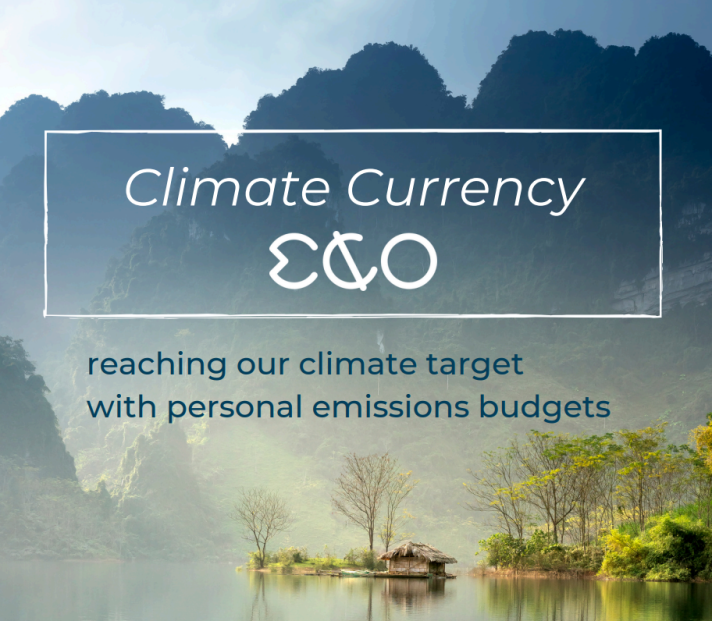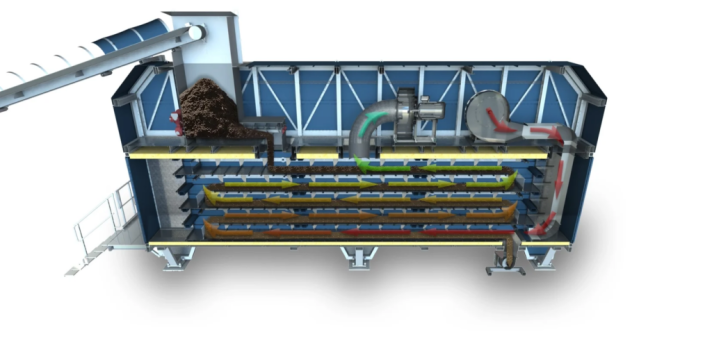
REMARKABLE Climate Neutrality Solutions Contest has brought together innovative minds across Europe, passionate about driving the transition to a sustainable, climate-neutral future.
Winner: SaveClimate.Earth’s ECO Climate Currency
Taking the top prize in the REMARKABLE contest is SaveClimate.Earth, a German non-profit organization focused on promoting a sustainable economy. Their winning solution is the ECO Climate Currency, an innovative model that reimagines how we manage carbon emissions at the individual and societal levels.
What is the ECO Climate Currency?
The ECO Climate Currency is an innovative model designed to transform how we handle carbon emissions on both an individual and societal level. It operates on the principles of "Cap, Personalize, and Trade," proposing a carbon currency system where every citizen receives an allocation of ECOs—CO2-equivalent units—on a monthly basis. This allocation acts as an ecological basic income, intended to be used for purchasing goods and services that consume fossil fuels. The goal is to make the carbon footprint of all products and services visible and comparable, empowering individuals to make informed choices about their carbon consumption.
Core Principles of the ECO Climate Currency:
- Comprehensive Emissions Mapping: The ECO system aims to track 100% of carbon emissions across the entire value chain, offering a more inclusive approach than the current EU Emissions Trading System (EU-ETS), which covers only about 40-45% of greenhouse gas emissions.
- Social Fairness: By distributing ECOs equally among all citizens, the system avoids placing a disproportionate burden on lower-income households, a common issue with carbon taxes.
- Market-Driven Industry Transformation: As consumers gravitate towards products with lower carbon footprints, industries will be pressured to reduce emissions more rapidly than under current systems.
- Tradability: ECOs can be traded between individuals, allowing those who need more to purchase additional ECOs from those with a surplus. This creates a direct financial link between high emitters and low emitters, incentivizing lower emissions.
The Atmosphere as a Shared Resource
At the heart of the ECO Climate Currency concept is the recognition of the atmosphere as a shared resource with a limited capacity to absorb carbon emissions. By linking this resource to a carbon currency, the system ensures that all carbon-intensive activities are accounted for, aligning consumption with environmental sustainability. Unlike traditional currencies, ECOs are tied to the finite nature of carbon resources, ensuring that global warming is curbed by regulating fossil fuel use.
Empowering Consumers for Rapid Change
A key advantage of this system is its ability to influence consumer behavior rapidly. As individuals strive to conserve their ECO budget, industries would be driven to adopt greener practices. This bottom-up approach leverages the collective power of consumers to enact swift and meaningful change.
While still conceptual, SaveClimate.Earth’s ECO Climate Currency presents a bold vision for a new carbon management system that could potentially replace national CO2 taxes and the EU-ETS. This system offers a socio-ecological transformation, empowering individuals to actively contribute to climate protection and fostering international cooperation on climate action
Learn more about the concept in a free e-book ”Exit Strategy Climate Currency ECO”.
First Runner-Up: SFTec Oy’s ModHeat for Waste Heat Utilization
The first runner-up is SFTec Oy, a Finnish company that has developed ModHeat, a technology designed to utilize waste heat for drying processes, particularly in the biomass sector. This innovative solution addresses a key challenge in sustainable biomass management—how to efficiently process materials with high moisture content that are otherwise costly to transport or store.
Impact and Benefits:
- Cost Efficiency: ModHeat has demonstrated the potential to reduce both operational (OPEX) and capital (CAPEX) expenses by up to 60%, according to pilot projects and research studies. This significant cost reduction is achieved by using waste heat from sources like data centers and industrial processes for drying biomass.
- Wide Applicability: The technology is versatile and can be applied in various sectors, including bio-coal production, jet aviation, and biomass gasification. By optimizing the use of waste heat, ModHeat supports the circular economy and reduces dependency on traditional wood feedstocks.
- Environmental Impact: ModHeat contributes to reducing waste by converting underutilized biomass into valuable materials, supporting sustainable energy practices and lowering overall environmental footprints.
SFTec Oy’s ModHeat solution is a practical and scalable technology with significant environmental and economic benefits. Its ability to leverage waste heat for drying processes could play a crucial role in making biomass-based energy production more sustainable and cost-effective.
Second Runner-Up: Terragami’s Climate Survivors
The second runner-up, a studio based in Austria – Terragami, has taken a unique approach to climate communication by utilizing video games to raise awareness and educate players about climate change. Their project, Climate Survivors, is designed to reach audiences that might not engage with traditional climate communication channels.
Key Elements of Climate Survivors:
- Interactive Learning: Climate Survivors combines popular game mechanics with scientific content to create an engaging and educational experience. Players navigate a world affected by climate hazards, collecting upgrades related to mitigation and adaptation strategies.
- Educational Impact: The game’s mechanics and challenges are rooted in climate science, offering players a hands-on understanding of climate issues. The game also includes a glossary for players to access more detailed information on climate-related topics.
- Broad Appeal: By integrating climate education into a mainstream gaming format, Climate Survivors effectively reaches a wider audience, including those who may be less receptive to traditional climate discourse. This approach helps shift behavior and encourages greater political and social engagement with climate issues.
Terragami’s project exemplifies the potential of video games as powerful tools for climate education. By combining entertainment with education, they are paving the way for new methods of climate communication that resonate with diverse audiences.
Moving ahead
The REMARKABLE Climate Neutrality Solutions Contest has highlighted innovative and practical solutions that have the potential to make a significant impact on our journey towards climate neutrality. From SaveClimate.Earth’s ECO climate currency to SFTec Oy’s waste heat utilization technology and Terragami’s climate awareness video games, these winning entries represent the diverse and creative approaches needed to move towards climate neutrality.
Details
- Publication date
- 26 August 2024
- Author
- European Climate, Infrastructure and Environment Executive Agency



